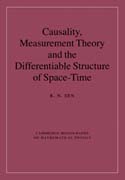
Causality, measurement theory and the differentiable structure of space-time
Sen, R.N.
Introducing graduate students and researchers to mathematical physics, this book discusses two recent developments: the demonstration that causality can bedefined on discrete space-times; and Sewell's measurement theory, in which the wave packet is reduced without recourse to the observer's conscious ego, nonlinearities or interaction with the rest of the universe. The definition of causality on a discrete space-time assumes that space-time is made up of geometrical points. Using Sewell's measurement theory, the author concludes that the notion of geometrical points is as meaningful in quantum mechanics as it is inclassical mechanics, and that it is impossible to tell whether the differential calculus is a discovery or an invention. Providing a mathematical discourseon the relation between theoretical and experimental physics, the book gives detailed accounts of the mathematically difficult measurement theories of von Neumann and Sewell. INDICE: Prologue; Part I: Introduction to Part I; 1. Mathematical structures on sets of points; 2. Definition of causality on a structureless set; 3. The topology of ordered spaces; 4. Completions of ordered spaces; 5. Structures on order-complete spaces; Part II: Introduction to Part II; 6. Real numbers and classical measurements; 7. Special topics in quantum mechanics; 8. Von Neumann's theory of measurement; 9. Macroscopic observables in quantum physics; 10.Sewell's theory of measurement; 11. Summing-up; 12. Large quantum systems; Epilogue; Appendixes; References; Index.
- ISBN: 978-0-521-88054-1
- Editorial: Cambridge University
- Encuadernacion: Cartoné
- Páginas: 412
- Fecha Publicación: 11/02/2010
- Nº Volúmenes: 1
- Idioma: Inglés
